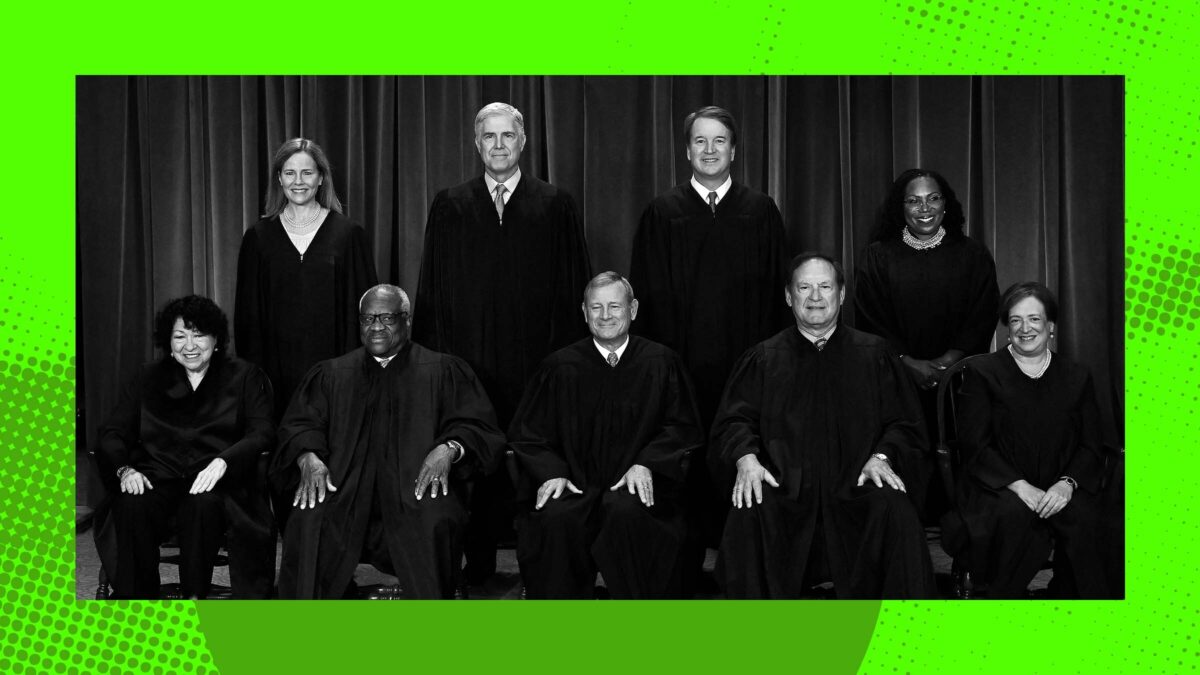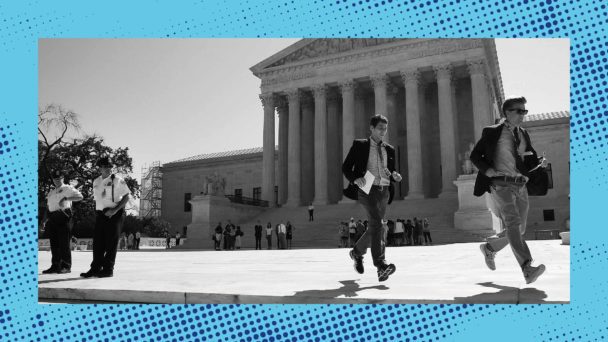On Monday afternoon at Duke Law School, a BigLaw partner named Kannon Shanmugam offered an impassioned defense of the Supreme Court, an institution whose approval rating has spent the last several years hovering at historic lows. “I believe that criticisms of the Court’s legitimacy are unfounded,” he told the students who’d gathered in a classroom to hear him speak. “But more than that, I believe that attacks on the Court’s legitimacy are dangerous—undermining public confidence in the Court and imperiling the rule of law.”
Shanmugam, a former clerk to Justice Antonin Scalia who now chairs the Supreme Court practice at Paul Weiss, confessed that he is typically reticent to opine on such sensitive subjects. But, he continued, he believes that lawyers who are have developed a “unique familiarity with the Court and its work”—to date, Shanmugam has argued 38 cases before the justices—bear a commensurate responsibility to “speak up when we believe that the Court is being unfairly attacked.”
The substantive arguments that followed are pretty conventional talking points among the handsomely-compensated Republican lawyer set: Lots of Supreme Court opinions are unanimous, not all cases break down on ideological lines, the legal academy has become too shrilly liberal for its own good, and so on and so forth. Otherwise, Shanmugam hit the same generic notes you would expect any speaker at any law school lunchtime talk to hit, and thanked the Duke Federalist Society chapter for generously sponsoring his remarks.
It’s great to be back at @DukeLaw, where I’ll be giving a speech later today addressing the recent criticisms of the Supreme Court’s legitimacy. Details here:https://t.co/wuSa2w0CP2
— Kannon Shanmugam (@KannonShanmugam) September 16, 2024
What I am saying here is that no one outside that classroom would have heard a blessed thing about this non-event if the Wall Street Journal editorial board, which functions as the quasi-official blog of the conservative legal movement, had not seen fit to lavish Shanmugam with praise for this display of courage and forthrightness. “As political attacks on the Supreme Court become more heated, the institution could use more defenders,” the board wrote. “So it’s welcome that a leading member of the appellate bar is speaking up to defend the Court and urging his colleagues to do the same.”
The board went on to characterize Shanmugam’s speech as “notable,” and helpfully included a 23-page PDF of his remarks, just in case readers found the editorial’s excerpts to be insufficiently satisfying. The board did not disclose how it was able to accurately gauge the newsworthiness of a student group meeting held in a modestly sized lecture hall at a law school some 500 miles away from the Wall Street Journal offices, or how it obtained a copy of Shanmugam’s remarks. Somehow, I suspect that it did not find a printout lying in the street. (I reached out to Shanmugam by phone and email about this story, and will update it if I hear back.)
Just about everyone in the legal profession’s upper echelons has good reason to ingratiate themselves with the justices: Practitioners have books of business to build, law professors have students to place in clerkships, and Supreme Court correspondents have dishy behind-the-scenes books to write. And if you are a law firm partner with a lucrative Supreme Court practice right now, placing a glowing write-up of your strident defense of the Court in the Journal is as close as it gets to guaranteeing that the justices will read it, short of going to their homes, knocking on their front doors, and handing them a copy yourself.
No media outlet enjoys a cozier relationship with the legal right than the Wall Street Journal. For one thing, its staunchly conservative editorial board has long been remarkably privy to the inner workings of an institution that ostensibly does not leak to the press, particularly in cases that are most important to the conservative policy agenda. In 2019, for example, the board seemed to have reason to fear that Justice Neil Gorsuch would vote to uphold the civil rights of transgender Americans in Bostock v. Clayton County, several months before he wrote a majority opinion that did exactly that. In 2022, while Dobbs v. Jackson Women’s Health Organization was still pending, the board suddenly raised the alarm that Chief Justice John Roberts might be trying to “turn” a conservative justice to vote to uphold (what remained of) Roe v. Wade. Roberts did not succeed, but subsequent reporting revealed that he was indeed trying to do what the board, for reasons its members conspicuously never articulated, was so worried about.
More recently, the Journal ran in its opinion section a soft-focus profile of Justice Samuel Alito, whom the headline deemed “the Supreme Court’s plain-spoken defender.” One of its two co-authors was David Rivkin, a conservative lawyer who was scheduled to argue a case before the justices a few months later. (Alito declined to recuse, explaining that Rivkin conducted the interviews in his capacity “as a journalist, not an advocate,” an explanation I’m sure the lawyers on the other side found satisfactory.) In June 2023, Alito even wrote for the Journal under his own byline, pre-butting a ProPublica report on his undisclosed fishing trips with a hedge fund billionaire with a lengthy argument about why he (again) had no obligation to recuse from said hedge fund billionaire’s case before the Court.
Shanmugam, who describes himself as a “lifelong political conservative” in his prepared remarks, acknowledges the possibility that he’d be accused of “kowtowing” to the justices. “I hope my track record refutes that criticism,” he writes, noting that, unlike many of his peers, he’s never publicly endorsed a Supreme Court nominee. “I am at a stage of my career where I have little to gain personally from weighing in on these issues. But if I am criticized, so be it.”
Unless Shanmugam immediately veered off-script and announced his retirement afterwards, this is plainly and almost offensively wrong. Shanmugam’s business is arguing and ideally winning cases before the Supreme Court, so that other deep-pocketed clients will take notice of his success and agree to pay his considerable hourly rate. For as long as he is practicing law, it will be in Shanmugam’s best interests to ensure that the justices think highly of him—or, at the very least, not badly of him—when it is time to cast their votes.
Throughout, Shanmugam casts himself as a reluctant participant in this conversation. “I have always thought of myself as a practicing lawyer, not a pundit,” he writes. “As a lawyer, my job is to play in the game; I leave the task of color commentary to others.” But a lawyer of Shanmugam’s stature choosing to do something like this is neither “punditry” nor “color commentary,” because the audience that matters is not the handful of exhausted twentysomethings wolfing down free burritos before their next lecture, while law students in adjoining classrooms attend a “Lunch & Learn” session on criminal defense and the local ACLU chapter’s fall campus kickoff. It is somewhere between six and nine very powerful Journal readers who feel entitled to more deference and praise than they’ve received of late, and were thus pleasantly surprised when they opened up their paper a few days later and got to enjoy the highlights.
I understand why Shanmugam would want to get his speech featured in the conservative periodical of record, for the same reason that I understand why people actually buy Hallmark cards for National Boss’s Day: Keeping the people on whom your reputation and livelihood depends happy is part of any job, and Shanmugam, who is also among the legal profession’s more online members, understands the hustle well. But do not confuse this fawning tribute to the Court’s honor for anything other than what it is: A savvy bit of marketing calculated to lift the spirits of the conservative justices, and boost Shanmugam’s chances of getting to five votes next time he appears before them.



